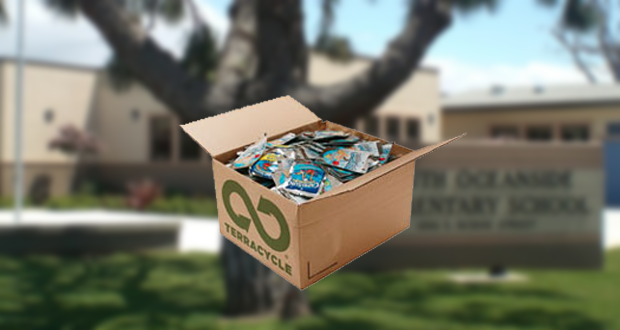Oceanside CA— Oceanside Unified School District (OUSD), in partnership with the City of Oceanside, has been on the Road to Zero Waste since 2012. In fact, OUSD became the first school district in the nation to formally commit to a goal of Zero Waste with the adoption of the OUSD Zero Waste Resolution in 2014. The City of Oceanside sponsored Zero Waste Initiative provides education, infrastructure, and support, and is implemented at a campus over a one-semester period. Through the ongoing strategic implementation of the OUSD Zero Waste Initiative, 12 of the 23 schools throughout OUSD are well on their way to reaching the goal of 75%, with the other half joining the Initiative by 2020.
The OUSD Zero Waste Initiative provides multiple benefits to the school district, including providing hands-on learning experiences that emphasize environmental stewardship and literacy that extend to the classroom. For example, last spring, Zero Waste Leadership students and City staff participated in an exercise to self-evaluate their school’s progress in reaching its Zero Waste goal. The following schools will be recognized as top performers in last year’s Spring Audit Challenge and awarded cash prizes courtesy of Waste Management during the OUSD Board Meeting on November 15, 2016, which happens to be America Recycles Day:
- Del Rio Elementary: Incorporated Zero Waste behaviors throughout school culture, which is demonstrated through their extensive recycling education and promotion, extending from the classroom to school events and to the surrounding community.
- South Oceanside Elementary: Included all grades (K-5) in the Zero Waste Leadership Team to engage all students in taking responsibility for reducing and properly disposing of their waste.
- Laurel Elementary: Continues to demonstrate their ongoing commitment to Zero Waste through administrative and staff support and provides on campus daily encouragement to reduce, reuse and recycle for their school, their community and their future.
These student-driven audits also included an evaluation of materials being sent to the landfill, recycling participation, barriers to Zero Waste, and an analysis of additional sustainable best management practices, such as food donation and bans on disposable. City staff was impressed with the leadership of staff and students at all Zero Waste schools.
The Zero Waste Schools Initiative also provides significant cost savings to OUSD due to avoided landfill services. In Oceanside, it costs significantly less to recycle materials then to landfill them. Therefore, the more a school site can recycle the greater potential for the District to lower the cost of overall services. Implementation of the OUSD Zero Waste Initiative thus far has saved OUSD over $80,000 in reduced landfill servicing costs and the savings will continue to increase as more schools join the Initiative.
Other benefits include a community connection for Zero Waste. “The OUSD Zero Waste Initiative plan follows a strategic implementation timeline to continue instilling Zero Waste behaviors in students as they progress through their school career. Through the school-to-home-to-community connection, these youngest members of our community play an integral role in meeting our community-wide Zero Waste goals of 75% to 90% by 2020,” explains Jenna Roripaugh, Environmental Specialist with the City of Oceanside.
Last spring, the Oceanside City Council reinforced the importance of this connection through the approval for the funding of $100,000 to purchase 42 permanent recycling/ landfill containers for both Oceanside and El Camino High School. These containers, which are the same as containers throughout the Oceanside Strand and Harbor, were installed at both campuses in June of 2016. Both High Schools are now well on their way to Zero Waste. In fact, tomorrow, November 4, 2016, El Camino High School will host a Zero Waste football game against Oceanside High School to show the community both school’s commitment to reach their Zero Waste goals.
During the implementation of the Zero Waste Initiative, two waste audits, one pre-program, and one post-program are performed to measure the amount of waste generated and the percentage recycled. This information is used to educate students and staff and measure Zero Waste success after implementation. Each school that has participated in this process has soared from an average 10% to 70% recycling rate in just one semester. In addition, the information gathered during this waste audit process has assisted the district in making changes to purchasing and procedural policies, including the elimination of purchasing polystyrene trays and spork packets and requiring each landfill container to be paired with a recycling container throughout Zero Waste school campuses. Since 2012 the partnership between the City and OUSD and continued to strengthen through ongoing and mutually beneficial initiatives that benefit students and the greater community.
For more information about Oceanside’s Road to Zero Waste programs and other Green Oceanside events, please visit www.greenoceanside.org.




